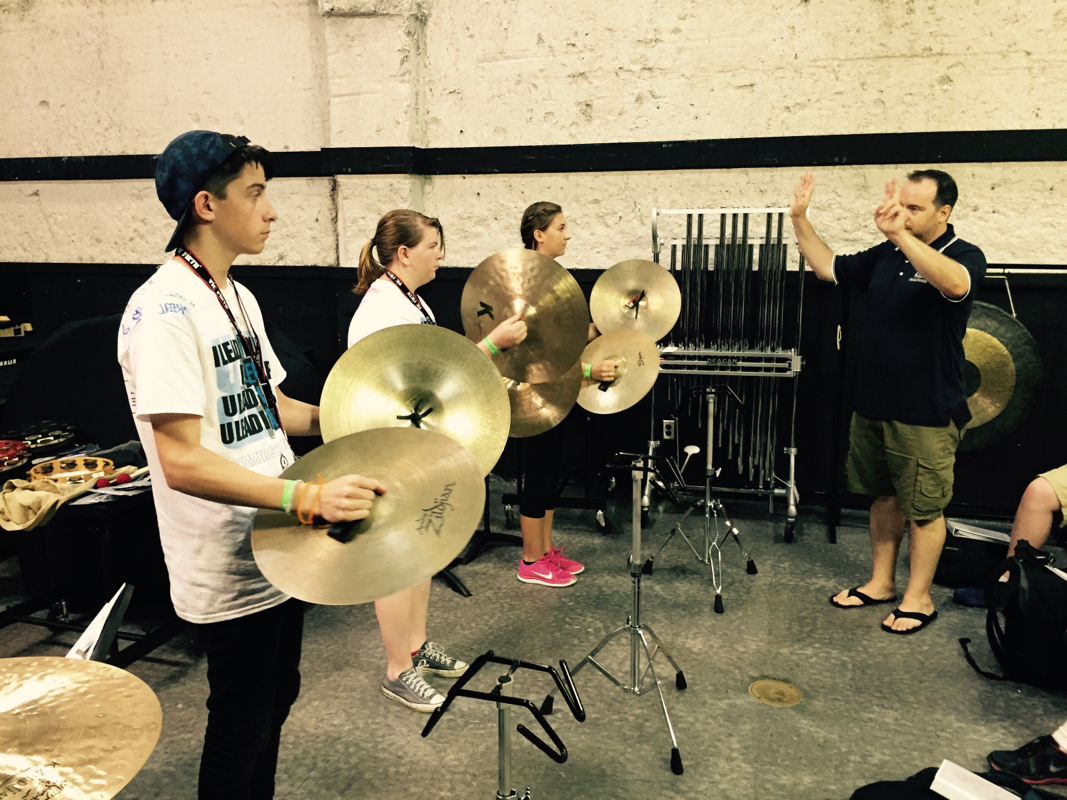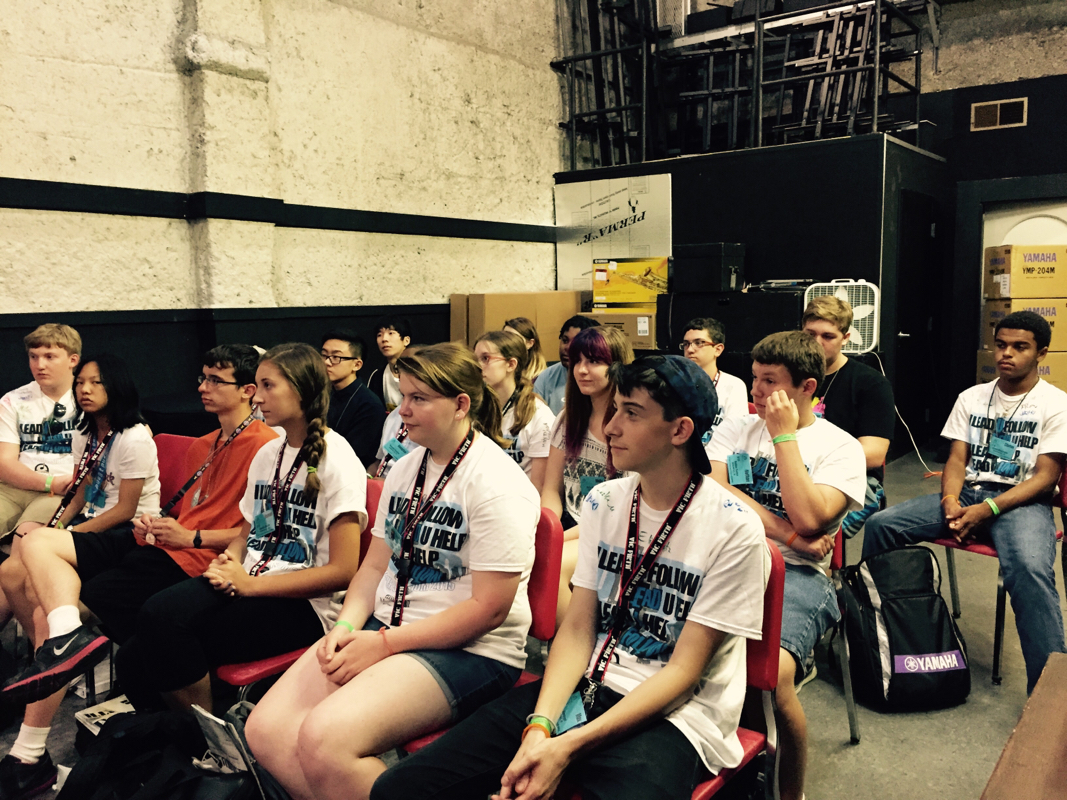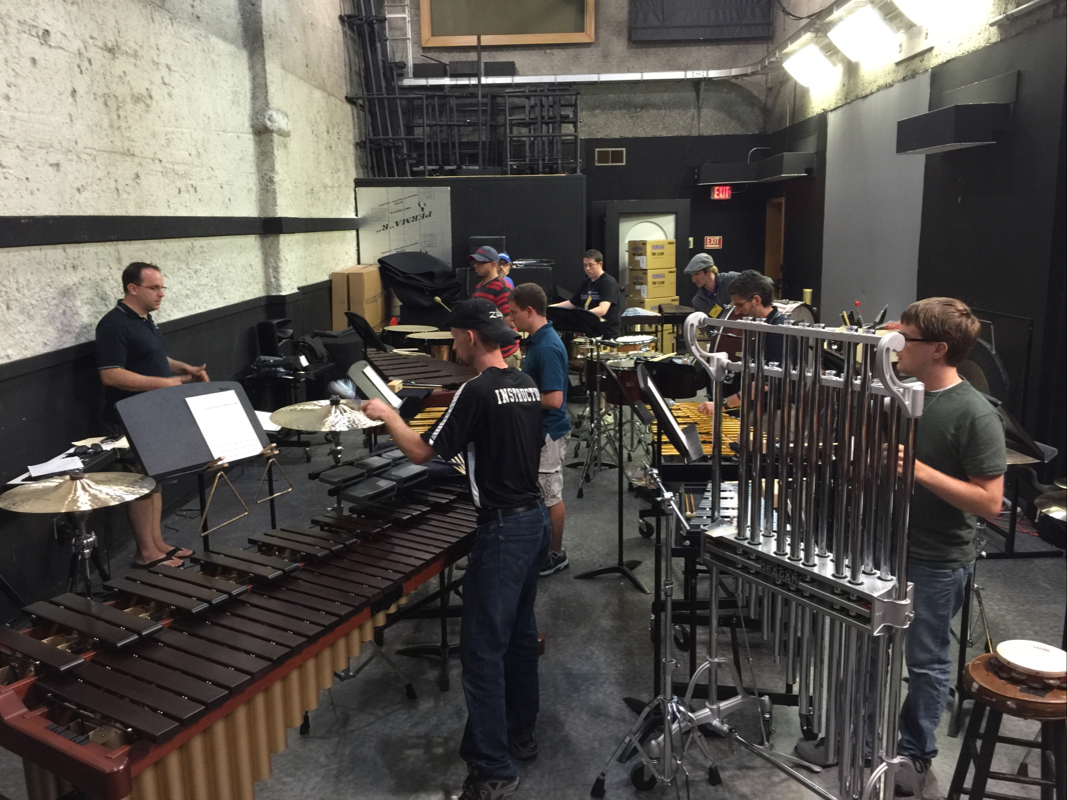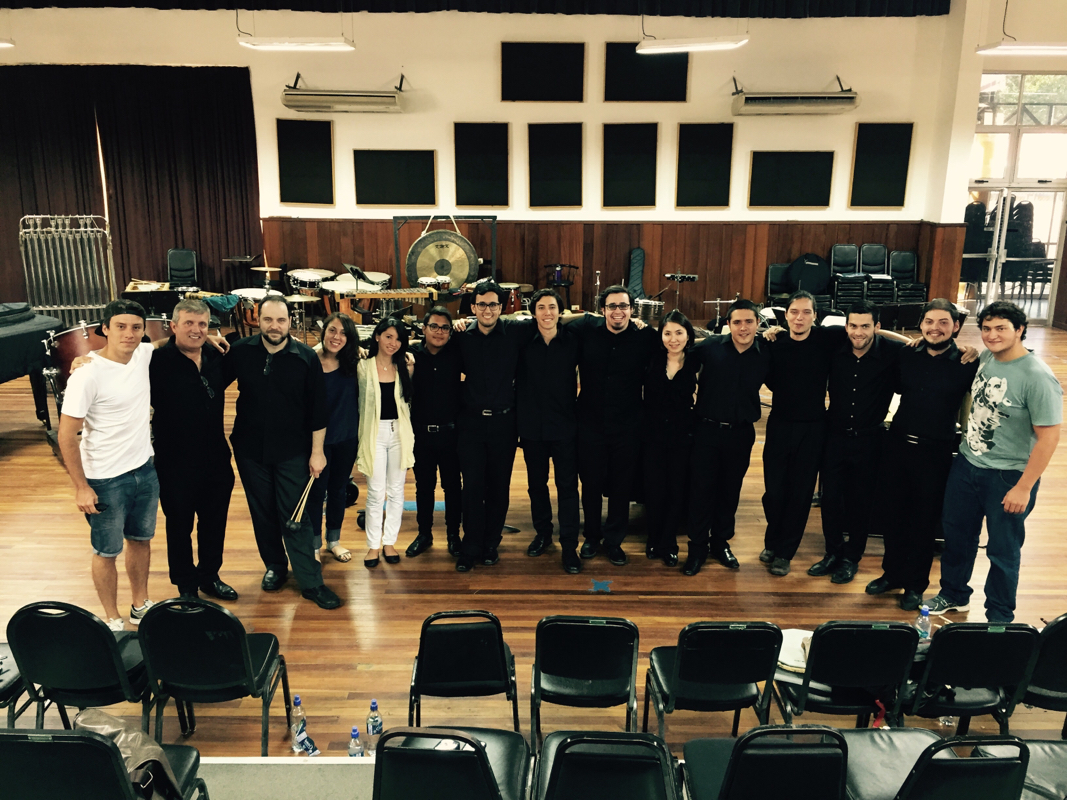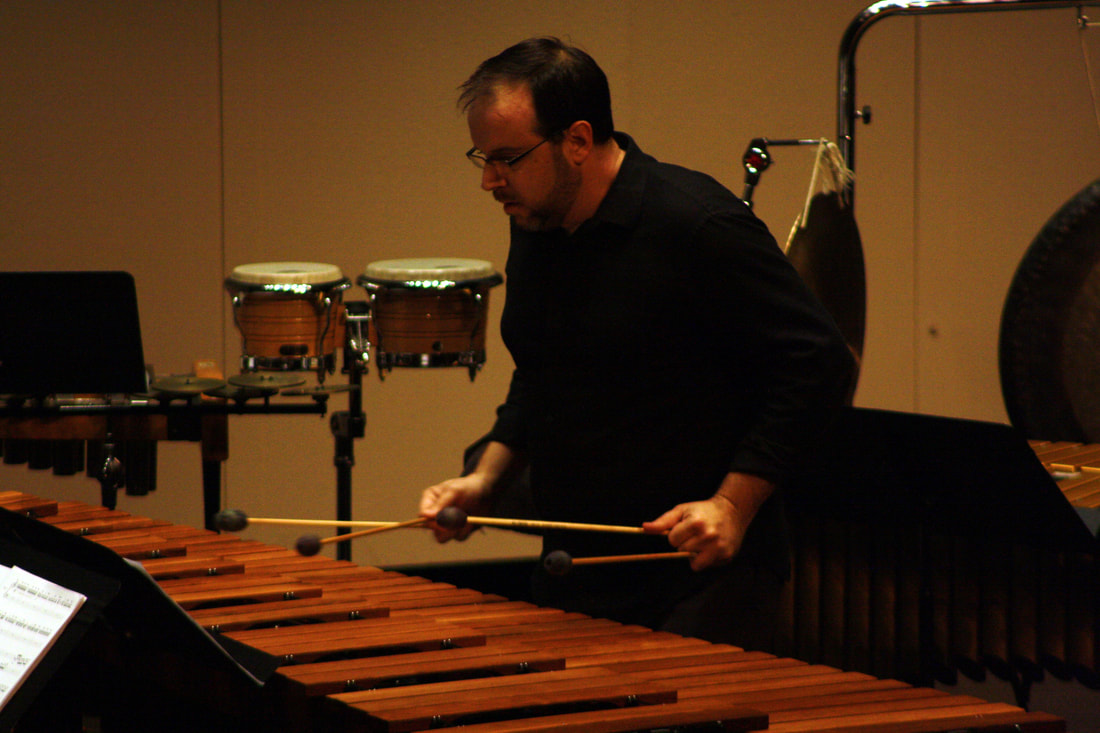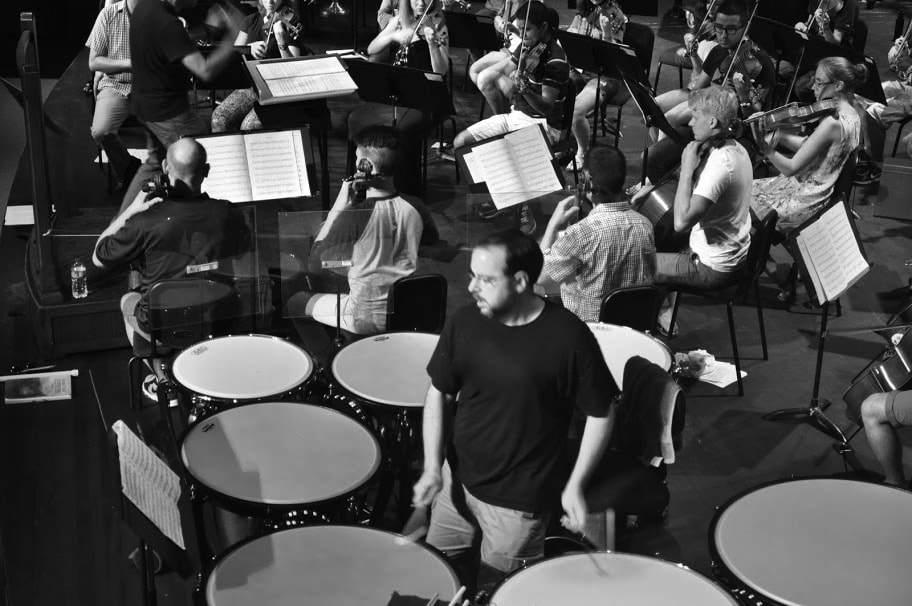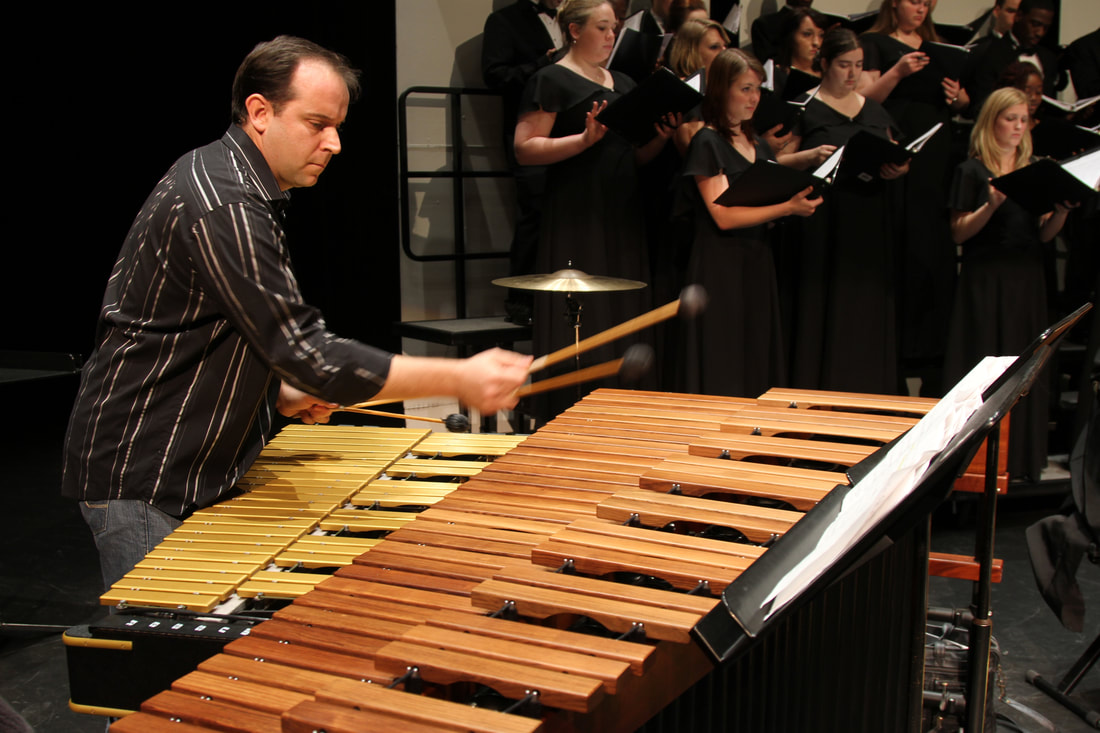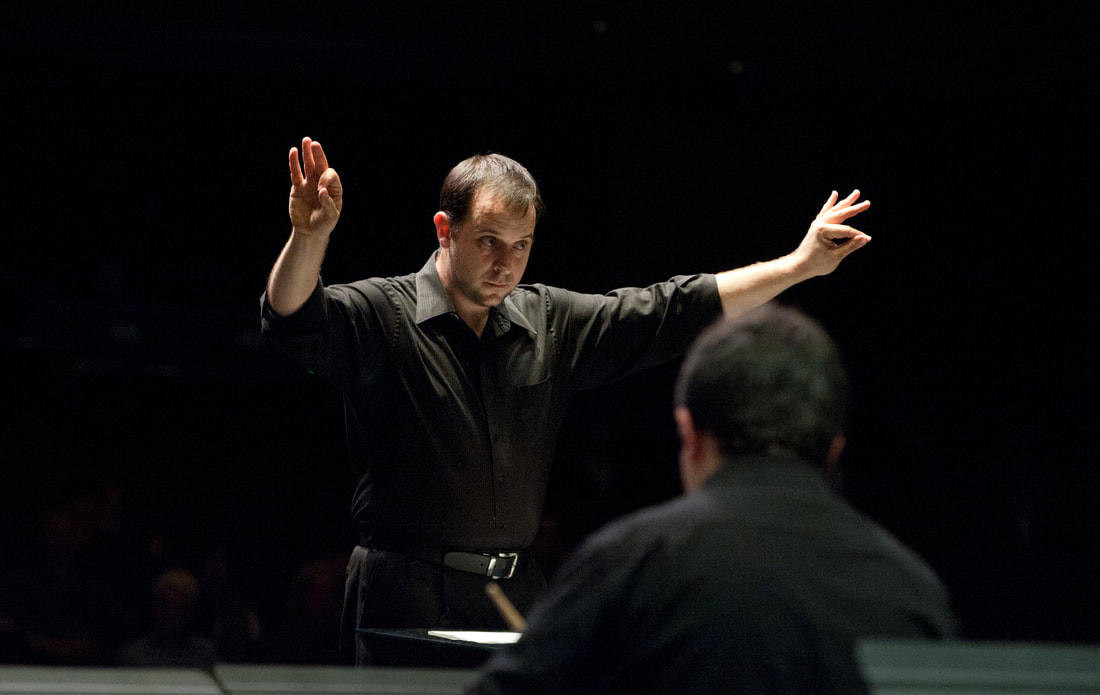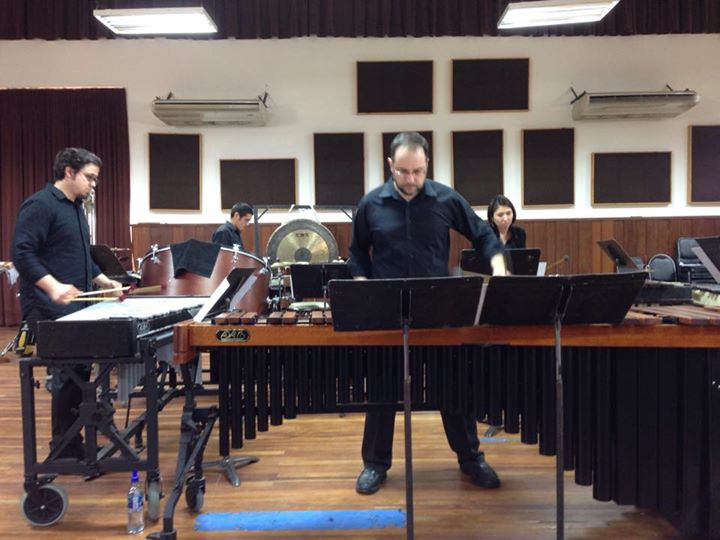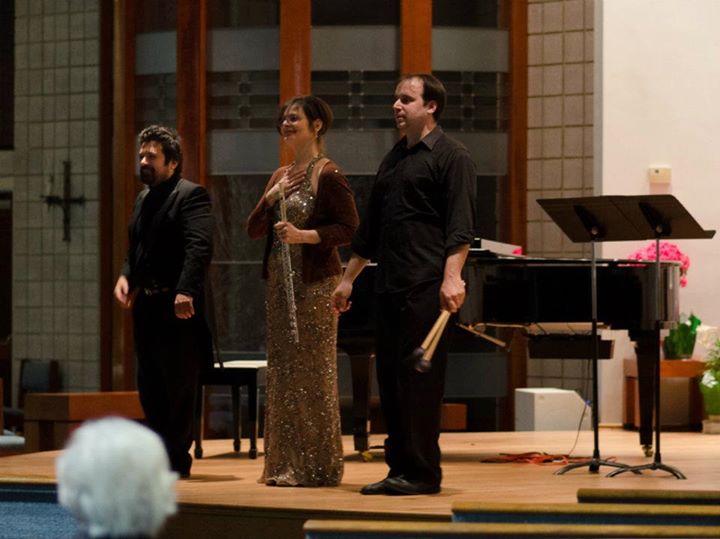|
I have written before about gratitude, being happy for the opportunities you have in the business. That is all still true.
I think everyone needs to remember that we are LUCKY to be musicians, LUCKY to have people who want to hear from us, and fortunate to have a life filled with bringing people some degree of joy through the arts I also like to be busy... Some say too busy. However I also find it very important to stop and reflect a little.... Look for patterns, places I can do better, and things I can point to and be proud of. Get moving, and keep moving, be leave a little time ( a few hours, or a day) to reflect and meditate on what you have done, and what is coming up..... Speak of - the next few weeks take me to the pit of the Kennedy center, the stage of the atlas performing arts center, a shared recital with chad burrow in Virginia and Michigan, a master class at nyu and finally to the music for all national festival in Indianapolis. Whew, hold on tight quick update - off to Lincoln Nebraska this week to conduct an honor band, looking forward to one more week of guest conducting. After this week, I'll be spending a few weeks performing as an orchestral percussionist and chamber musician. Looking forward to returning to the back of the orchestra, and sharing the stage with some terrific performers - more to come on that
I was thinking today about what students worry about - often students see professional musicians at a certain point in our careers and think "if I don't do that by a certain time....I'm a failure" They see fancy websites, podcasts, concert performances, tours and audition success - What they don't see, unless we tell them, are our own failures. They didn't see us shedding for auditions at 2AM, or getting our resume's rejected from auditions, or loosing competitions, or cold calling contractors/players in town to get gigs - or teaching 20-30 or 40 lessons a week to pay the bills. They were not there when you first started your program, had to beg for students, or struggled to pay the bills. Every "successful" musician has a story to tell the next generation - it isn't always easy to tell, and you certainly don't pull the curtain back all together at once - but being honest about the business and the work it takes to do well - that matters. been a little while since I last posted.... Winter break ( I actually took a break) and the start of the semester kept me busy.
I'm now sitting at a chilis in Pittsburgh, on the second of three consecutive weeks on the road. This time it is conducting, and I'm having a wonderful time working with some truly terrific students. First, Austin Texas, conducting the region 18 5A wind ensemble, one of 5 honor bands. Had a terrific time with some really wonderful musicians and colleagues. Got to visit with and do some classes Kathy Humphrey at Cele middle school and Ryan Cirna at Pflugerville HS. Also spent some time at Ann Richards school for exceptional women leaders and their great band director ( and mason alumni) Stephen Howard Then it was off to Pittsburgh and the Alle Kiski honor band. Great, hard working students and some really wonderful teachers. Had a blast re-visiting the Mackey Strange Humors. However, the only bad part of this particular trip was the massive snowstorm that hit my hometown. As of today, Saturday Jan 23, I'm still here in Pittsburgh, unable to get down the PA turnpike or anyplace remotely close to DC or NOVA. Pittsburgh has a few inches of snow, but DC apparently has 20++ and it's still snowing I'm in a nice hotel, close to a movie theater, restaurants and a mall. I think I'll check out the Warhol museum tomorrow. I hope to make it home Monday.... Time will tell. My hosts here have been great and I'm making the best of it, but I would like to be home!!!! If I do get home, it will be for a couple of days, before I leave again for the PMEA district 7 honor band. Good times and hopefully easier weather :) The joys of road work. I'm supposed to go to Nebraska in February.... Stay tuned I just returned from PASIC in San Antonio. I had a blast reconnecting with old friends and making new ones. Enjoyed the expo room, and the "hang". Also saw some performances and presentations - Chris Lamb, as usual, reminded everyone that we should be humble....as long as he still has a stick bag.
However I was most struck by the emeritus section, lead by Alan Abel and Richard Weiner. Full disclosure - I studied with Alan so I'm going to be inclined to like what he does. However, there is more to this then my "fanboi" status for a former teacher and mentor. When I looked on that stage one thing struck me more than what they played or how they played. These guys, to a person, joined their orchestra before it was "hip" to be an orchestral player. They won their jobs before the modern audition system, before mallet endorsements, custom drums, before blogs, subscription websites, summer seminars or anything available now to both students and professionals. No excerpt books, "vlogs" or annotated guides to study. What they did have was passion, ears, hands, and brains. Of course, some had mentors in early conservatory programs - nothing however, like the resources, support or guidance available today. They listened, adjusted, strived to make good sounds, and in general just did their job really really really well. Every day. They wrote their excerpts out by hand, and learned by doing, by trial and error, and by being open to criticism. That criticism, just as an FYI, was not couched in the warm and friendly lingo of today's modern, emotionally connected world.... Make no mistake, today's musicians ( myself included) are highly trained, smart, talented and dedicated. This is not "back in my day..." Post. I love where we are as percussionists - some of the best playing and teaching is happening right now, all over the country. The level is higher than it has ever been, and we are not even begun to fully explore percussion as a chamber or solo/concerto instrument. No doubt, this is a fantastic time to be a Percussionist However, the next time I hear "well I can't do this because of that... " or "I just don't have the right mallets or sticks...." Or my personal favorite - "well no one told me what to do?!?" Go watch a video of Alan and Richard playing Scherazade... And then go practice Trust me, someone a long time ago played snare drum better then you....and they did it without a a video tutorial. Go shed......and strive to do them justice i always have mixed feeling when I travel for work. I really enjoy performing, giving classes and working with other students, but I am always worried about my folks back at Mason.... Not that they are doing anything wrong, I just never want to be a drive by professor. I'm actually pretty happy we have reached the point where I can leave and let grad student run a studio class, and deal with departmental programs, and the students can coach ensemble on their own
I mean, I love to perform, and it is important both personally and professionally that I am out in the field working, recruiting etc.... It makes the program better and brings much needed attention to the great work we are doing at Mason Still, as I write this on a plane to Illinois, I cannot help but run a list of things over And over again in my mind.... Just to make sure they are ok. I guess that's a good thing. This will be a short post, since I'm kinda swamped at the moment :)
However, if you are a music student, or a professional in the early phase of your career, please, please please stop saying how busy you are, how much stress you are under, how tired you are etc.... As a musician, regardless of performance/education/industry etc... you WANT to be BUSY. YOU NEED to be busy, you better hope that you are busy. manage your time, manage your varied interest, and know thyself - but ALWAYS welcome the opportunity to perform, teach and "be" a musician - some day, someone will show up and want what you have - Keep working, be involved and don't complain about having a lot to do, or before you know it, you'll have all the time you want. how often to we get this question? From concerned parents, nervous high school students and even college music majors having a crisis or concern about their career.
Often, you'll hear advise like this Do what you love and you'll never work a day in your life!!! Or follow you dream and you'll never regret it!!! :) Or... My favorite, do you LOVE music? Cause if you do GO FOR IT!! I tend to think that is a load of garbage that does nothing to actually answer the question. Make no mistake, music is work, it is a job, and it should be treated as such. You must have the drive, skill, talent, and brains to be successful. When I am leaving my studio at 11pm, or driving downtown to play a concert on a Sunday, or Friday or any day, I am going to work. I love what I do, but I don't love it every second of every day.... No one does and take silly to think that just because you love music you should try to make it your profession. Typically I ask these questions when talking to a student who wishes to play or teach music for a living Do you enjoy being alone in a room for 4-6 hours every day? How about 8 hours when getting ready for a recital or audition? How do you deal with rejection? Cause you'll fail more often then you will succeed in music. Do you want your weekends "off"? How about holidays? How are you motivated? Do you have the ability to get yourself up to work without an outside motivating force like a teacher or coach? Can you work alone or do you need to always be practicing/learning music together? What kind of parental/family support do you have? Is there someone telling you to quit or have a fall back plan? If so listen to them and decide if they are correct..... You'll need your family or some type of support system to get to into the profession successfully Can you take direction? Are you a good follower? As a musician you aren't always in charge of your time, literature or musical ideas, how does this make you feel? Speaking of time.... Can you manage your time or do you need someone to help you with that? The music business is a great big wide profession with a huge number of pathways - what do you want to do? Do your homework, read study and talk to musicians in the business? Is it orchestra job or bust? Would you be happy freelancing? College teaching? Public school? Do your research, take lessons with people who do what you wanna do, think and be an active member of the business from the very start. People who finish last in medical school are called Doctor, people who finish at the bottom of their class in music school are called hungry.... ALWAYS keep music in your life, go to concerts, have your children study and participate in school bands, play in your local community orchestra, but don't jump into this business without knowing everything about it 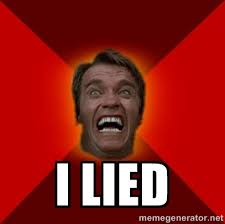 So, I lied I said in an earlier post that I wouldn't talk about picking a school.... Yet here I am, About to jump in and tell people what to do! Really, I have advised a large number of high school and college students as to their next steps. I tend to write in smaller, quick chunks, so this will likely take up a few posts - here we go:
I can recall just this year spending a day with a prospective student, I could tell they were having a hard time deciding between Mason and another in state school. Cost wasn't an issue ( academic scholarship from both institutions) and proximity to home wasn't an issue ( this can often be a deciding factor for students). As we spoke and I asked her some of these questions, we both realized that a school right outside Washington DC, with a large ( 24 majors) and competitive program with other students who do festivals and DCI corps wasn't really her bag. She wanted something entirely different and would have been miserable at Mason. I was happy to spend the day with her, and even more happy to help her decide on the right school for her. This is a big point - it isn't the 1980s or 1990s anymore! In 1994, when I was looking for a college, I had 4, maybe 5 realistic options for a serious music performance degree. Now, I think there are 15-20 legit undergraduate programs that can offer high level, symphonic, contemporary chamber music programs to a motivated undergrad. This is great, but also means that the choice is much more personal, and focused.
When selecting a school you are likely going to be drawn by the person who teaches percussion - you met them at PAS, saw a youtube video, a friend went there, they are "famous" or perhaps someone you admire in the business studied with them. They do ( or did) what you want to do, so you are drawn to them - perhaps they have a dynamic personality, high profile in the field etc... And ask these questions, either as you read someone's bio, or in your conversation: what are they doing and how involved are they in the business now? Are they still performing? How often? Where? How often are they on campus and how regularly will you see them for lessons, master classes and studio class. Are they full time, adjunct? Do they teach at 2-3 different schools? There is no correct/black/white answer to any of these questions - all you are doing at this point is "fact finding". I didn't care that my teachers in undergrad were all "adjunct" I cared where they played! Something will resonate with you, and will lead you down another path of questions. Questions like: What are your graduates doing? Will I always see you for a lesson, or will I have to study with a grad assistant? Remember when you are talking to the professor, they are making evaluations of you as well - always be respectful, and get as much information from their bio BEFORE YOU E MAIL THEM! Sometimes, you cannot speak directly to the professor.... and you end up talking to admissions people, or someone in the school of music office. These folks are trained to sell you on the school - Look at all the glossy, fancy websites, print advertising and social media. Then, largely ignore it. Watch the videos, listen to the admissions pitch, and then ask: 1. What are you scholarship opportunities, and how do I apply for them? 2. Can I see your practice facilities? How much time does each percussionist get in each practice room? What kind of access do I have to equipment? How late is the building open? 3. Can I get a lesson with the teacher(s)? 4. Where can I find audition information? * a note about the word conservatory....I've often joked with my colleagues at Mason that if we decided to one day change our name to the Mason Conservatory, we would triple our enrollment overnight!! Just having the word conservatory next to a school's name doesn't mean a thing. Really. Be careful on this one. Next up - PARTICIPATE. Visit the school, attend a summer program, and take a lesson. Oh, and GRADES..... On Selecting Literature - this is an addition to an earlier post - see below for the start everything. Orchestral excerpts: for undergrad auditions not typically asked for, unless you are auditioning at one of the major conservatory programs. If you are not totally familar with orchestral rep, don't bother. Prepare: Of course pay close attention to dynamics, musical ideas, shapes etc...but also know something about each composer you are performing. For example - do they have other works for percussion? Have you played them? Why did they write this piece? Was it a commission, from a book etc..? The more you know, and can share, the better. Also, with all forgiveness to my composer/percussionist friends, unless you are a graduate student with a highly developed interest in writing music, you rally don't want to bring your composition as your ONLY solo - perhaps if you bring it with you, but make sure you cover all the bases first. Plan ahead: The spring before your senior year you should start looking at various pieces with your teacher, with the goal of having the program set by mid summer. This gives you some time to make changes and adjustments going into the busy fall season. A note on graduate auditions: This is an entirely different subject. MM programs are so personal and specific it is hard to give general advice. All i can offer is this- know exactly what you want, and you'll find the right program. Chamber music, orchestral, solo, big city, small town, etc.... Get to know the students in the program, research the teachers, and look at what type of scholarship and grant opportunities exist. Up until now, this blog has primarily been about my playing, teaching, work at Mason, Sewanee, and other places etc...but I thought it was time to start adding some educational articles and ideas as well.
So, why not start with what many of you have coming up College Audition Observations - Part 1, some general thoughts I am proud to say we heard a record number of undergraduate and graduate auditions, nearly 40 in all, with an overall quality that is higher than ever before. Over the course of these and previous auditions, I have begun to notice some patterns emerge particularly among high school students. In discussions with my colleagues across the country I think it is fair to say these are national trends, which are both encouraging and perhaps a bit concerning. I thought it would be helpful to offer some observations, thoughts and suggestions both for students and teachers. I won't be discussing the specific university selection process or how to "pick a school"..... Many resources are already available for those seeking that information. Of course, some of this is common and perhaps already out there in the community but it cannot hurt to hear it again! To start, the level of keyboard playing, particularly four mallet solo marimba performance, literature, attention to detail and sound production are all at a level that is higher than ever before. However..... YOU REALLY NEED TO BE ABLE TO PLAY SNARE DRUM. For whatever reason, the development of snare drum technique and the ability to control and produce and even sound on snare drum is suffering. Decent rudimental skills are not enough ( and frankly are often lacking), the demonstration of concert techniques, soft playing and roll control are all vital to the overall development of the concert snare drummer. Most universities are looking for comprehensive players at the undergraduate level who can, at the minimum play keyboards, snare, and timpani, and demonstrate multi percussion skills - drum set skills are a plus and will often be asked on auditions. Select literature you can play. Often students will try and push themselves to do something harder than they can, thinking they have to impress the committee - we really want to see where you are NOW and what your potential is for future success. Don’t spend your time searching for the newest, hardest pieces, just prepare well, and plan. It is painful to sit through someone struggle to play the latest and the greatest, only to fall apart in a basic sight reading....which brings me to - Yes, you have to sight read. Sight reading is a vital tool that we use to determine not only how well you play your instrument, but how you will handle ear training, theory and ensembles. Keep in mind you are not just auditioning for a percussion program - there is a music school behind all of those drums. Which also means..... You should be prepared to sing and match pitch. Again,it is not good enough just to be a decent drummer or a virtuoso marimba soloist, if you cannot match pitch, you will not pass aural skills. Understand music history, theory and have the ability to not only match pitch, but identify intervals and chords. Dress for success. This one is pretty clear, isn’t it? You would be surprised how students will dress, both at the live audition and auditions video's. A word on audition videos - if you send an audition video, either directly through youtube or using decision desk, acceptd or any number of other pay services, remember that this is an audition. Don't record in your bedroom in shorts and a tee shirt, or think it is "creative" to record outside, poolside or anyplace else that you think will make us "remember you." We will remember you if you play well!! Consider this a live audition, look directly into the camera, introduce yourself, tell us what you are going to play, and then play. Bring a resume and literature list. Take the time to make a nice, clear, easy to read resume, a list of rep you are playing at the audition, and a representative list of music (orchestral, solo, chamber, method books and solos) you have done over the last two years. You can also put one set of copies of all the music in this folder, put a nice cover on it, and hand it to the professors in the room. Believe me, this goes a long way. If you are sending a video audition, make sure the supportive materials are sent to the committee, or available on your audition page. Be prepared to answer " why". Why do you want to be a music major, why do you want to study with me, why did to pick that piece, why do you want to come to this university? If you mumble or stumble through these answers it will send a bad message to the committee. Also, have one or two basic questions ready to ask - often the committee will as you of you have any questions, and it is worth it to be prepared. They cane be generic " I'm curious about your scholarship opportunities" or more specific to the school/teacher/studio - just have something to ask that allows you to interact with the committee. Next up - SOCIAL MEDIA! What it means, how we use it, and how you should use it! I think I'll just leave this here, a small sampling of the great time we had at Sewanee - thanks for a wonderful summer 2015!!! I'll be posting more about the festival here during the year. Can't wait to get back on the mountain in 2016! Finished a terrific week at the Music for All Summer Symposium. Grateful to everyone for inviting me, and looking forward to the next time I get to work with Michael Mcintosh, David Collier and Thad Anderson. Below you'll see some pics from the week, along with some photos from my time ( so far) at Sewanee. I was asked to conduct part of the July 4th band concert, which was great fun, and of course many shots of the students hard at work learning all of the notes we throw at them! right when I got back to Sewanee I had the chance to play a concert with Joshua Roman - We performed as part of his residency at the SSMF - "Mariel" by Osvaldo Golijov. A truly remarkable work which I hope to play again soon Next up here at the festival are student performances of Nordic Peace, Cage 2nd construction, Kyoto, Haydn quartets (set for mallet quartet, of course) and a couple of additional faculty concerts, and of course a great number of orchestral performances, and the concerto competition winners next week! A busy and rewarding summer for sure. Having a GREAT WEEK here at music for all!! We have a large number of students participating in this years concert percussion track. Also enjoying my time with the percussion. Specialist academy directors and terrific colleagues David Collier and Thad Anderson More to come on this soon! I'm about to depart for my 5th summer in residence at the Sewanee Summer Music Festival. Sewanee is a special place - kind of hard to describe. Yes, it is a music festival. A wonderful chamber music and orchestral training academy for very advanced HS and college students. Wonderful faculty, great conductors and an enormous amount of playing in a VERY short time ( 4 weeks)
But the totality of the experience is far more than just playing music. I don't know if it is the mountains, the pace of life, the community, or the people, but something just makes Sewanee a unique place to spend time. I look forward to re-charging my musical batteries there each summer. This year, I'll be performing on three different faculty chamber music concerts, teaching 11 private lessons and coaching percussion chamber music. And riding my bike. And hopefully spending some real quality time by the pool with some great friends and wonderful students. Each time I hit the exit for the University of the south, and cross the boundary for the domain if the University of the South, I slow down, smile and say quietly out loud - "ahhh - Sewanee" http://sewaneemusicfestival.org/ In addition to my time at SSMF - I am on the faculty for the Music for All Summer Symposium. the MFA symposium is a wonderful educational experience for band directors, future teachers and talented high school student. Hosted at Ball State University, I look forward to connecting and reconnecting with wonderful colleagues and sharing what I know with the teachers and students attending the symposium. A great week, with great people. http://www.musicforall.org/what-we-do/summer-camp Finally - I return to Northern Virginia and promptly jump into our own summer percussion camp at George Mason University. Each summer, our faculty, alumni, guest artists and most experienced graduate students work with NOVA area middle and high school percussionists. In one week, we cover marching percussion, concert percussion, jazz, afro cuban, steel pan and chamber music. In addition, there will be daily special performances and a "grand finale" concert showcasing all of the students in performance. This has been the pattern for the last few summers - busy and rewarding. A great combination of teaching, performing and travel. Can't wait to get started! A somewhat quick update here. As I've already mentioned, this past fall I was interim conductor for the Mason Wind Symphony. This lead to an exciting opportunity for me in the spring semester - I was pleased and honored to take over the Mason Symphonic Band. I'm looking forward to continuing my work with the band this next season. We have some great plans for next season, including some wonderful concerto opportunities for members of the group, and opportunities to collaborate with some of our outstanding mason faculty.
I am also excited to expand some of my guest conducting opportunities - next season I'll be appearing as a guest conductor in Texas, Nebraska and Pennsylvania. Looking forward! As busy as life can be, it helps, from time to time, to sit back and reflect on what has been accomplished. Typically, the best times for reflection tend to fall over the winter holidays ( AFTER the last Christmas job, final exam, jury etc ...) and the time from the traditional end of the concert season, before the summer hits. For me, the time from May 15-June 15 is a mini "holiday" break, allowing some time for review and practice. Music for all, Sewanee, and the Mason Percussion Academy loom large in my schedule, but for now, I would like to share a few highlights from the past season - roughly broken down in performance and educational events.
Starting first with Mason: Fall 2014 offered me the opportunity to serve as the interim conductor for the Mason Wind Symphony. My good friend and colleague, Mark Camphouse, took a well earned study leave to, among other things, complete his latest book, and he trusted me to take the reins of his ensemble for a few months. Joining me was Denny Stokes, director of the Northern Virginia Youth Winds. We had a blast - collaborating with Rodney Marsalis Philadelphia Big Brass, Doc Nix and the Green Machine for our opening season concert. For our second concert Nov 13, 2014 - we were once again collaborating - this time across a couple of different languages. George Mason University was honored to host Col. Zhang Haifeng, Chief Conductor and Head of the Peoples Liberation Army Band, and his colleague Junqiu Gu for a semester of intensive study and cultural exchange. Col. Zhang worked with many of our faculty, visited our military bands, and attended many performances in and around Washington DC. We were honored to host him. Back to the concert: We chose to highlight music from across the world. Denny took Russia ( Prokofiev and Shostakovitch) I had the honor of conducting Gu in the Webern Concertino and the Debussy Engulfed Cathedral. The highlight, however, was Col. Zhang and his stunning performance of two original works from China, and a exciting encore - the Star Spangled Banner. He is a master musician, and our students are better for having had the chance to work with him Around the same time all of this was happening, I was preparing the mason percussion group to perform at the Virginia Music Educators Conference in Norfolk. The Mason Percussion Group is a collection of our finest performers who work without a conductor and perform some of the most challenging literature in the cannon. For this performance tour, we took a diverse program including the Black Page of Zappa, Tinplay by Per Andreasson, Trevino Catching Shadows, and the third movement of Vinao's new sextet - Water. It was a great time, and an honor to play for my colleagues in the state. This was, of course, on top of some terrific student recitals and concerts of my own. A great fall semester for sure Next post - some pictures and a spring semester recap. Also - previewing SSMF, Music for all, and a chat about freelance work! So, who got to spend a week teaching and performing in San Jose Costa Rica.... I did. Brought three mason students with me to play mallet quartet, estudios de frontera, ambient resonances, and two Costa Rican pieces
Pics and more details coming soon! This past week, I was honored serve as an evaluator for the 2015 Music for All National Festival and the Sandy Feldstein National Percussion Festival. We ( Jim Campbell, Nathan Daughtrey and Thad Anderson) listened and offered comments to 11 HS and MS ensembles, and I was honored to clinic three groups- Lassiter, Park City and Pfugerville HS
Thanks to Yamaha, Vic Firth, ZIldjian and Remo for their support and to William Galvin, Festival Director for running such a well organized program. These are some of the best ensembles in the Nation - Bravo to all of the students and Directors. American Youth Philharmonic Orchestras Percussion Ensemble - Annandale, VA; Doug Wallace Dobson H.S. Percussion Ensemble - Mesa, AZ; Joseph Anthony Goglia Farmington Junior H.S. Percussion Ensemble - Farmington, UT; Heath Wolf Grain Valley H.S. Percussion Ensemble - Grain Valley, MO; David Gronneberg Lassiter H.S. Percussion Ensemble - Marietta, GA; Mike Lynch Llano Junior H.S. Percussion Ensemble - Llano, TX; Keith Riley McLean H.S. Percussion Ensemble - McLean, VA; Chris Weise North Gwinnett M.S. Percussion Ensemble - Sugar Hill, GA; Travis Downs Park City H.S. Percussion Studio - Park City, UT; Bret Hughes Pflugerville H.S. Percussion Ensemble - Pflugerville, TX; Ryan Sirna Yorktown H.S. Percussion Ensemble - Arlington, VA; Brian Bersh This past fall I was honored to "fill in" along with Denny Stokes, as the conductor for the Mason Wind Symphony so that my good friend and colleague Mark Camphouse could take a well earned study leave.
We had a great time working with the Wind Symphony, exploring some new literature, working with two guest from China, and sharing some terrific concerts with the Rodney Mack Philadelphia Big Brass, and the McLean Symphonic Band. You can see some of the photos from the fall semester above. This semester, I am collaborating with Brian Walden and directing the Mason Symphonic Band. Our first concert is April 21 - the students are doing a great job! Come check it out! April 21 - Center for the Arts Concert Hall at 8PM Mason Symphonic Band - John Kilkenny and Brian Walden, Conductors Mason Wind Symphony - Mark Camphouse, Conductor Been on the road a bit the last few weeks - enjoyed a great visit to UT austin, with some pics below - thanks to Tom Burritt for the invite! When I was in NYC at NYU - I had the great chance to sit in on John Wittman's session for the percussion studio. I was in the afternoon, and JW in the evening, a great day for the NYU students, and a lot of fun for all of us - as always thanks to Jonathan Haas for the continued support and invitations to work with his terrific students! Next up - the Music for All National Percussion Festival, a quick trip to Boston, and some great orchestral playing here in DC - and a recital with Julianna Nickel, oh and some exciting international work. So many good things happening this week - I'm at NYU again on Tuesday, will be performing in a faculty recital on Thursday at Mason - a clinic at McLean High School Saturday AM, another session at the Fredrick Day of Percussion Saturday Afternoon - ending the day as a guest on Tim McCay's faculty percussion recital at Howard Community College. Oh, and House of Cards comes back. NYU - Tuesday Feb 24 3:30-4:45 George Mason University Percussion Faculty Recital Thursday Feb 26th 8PM. de Laski Performing Arts Building Mclean HS percussion clinic - 9-11 AM Saturday Fredrick CC Day of Percussion 1PM Saturday Howard CC Percussion Recital Feb 28th 7:30 Monteabaro recital hall Just finished a great few days in Austin Texas. Had the chance to spend some time with the terrific students at Cele Middle School and their FANTASTIC teacher, Cathy Humphrey! I actually was asked to sign autographs....which kinda blew my mind. Great kids Next up, after a visit with Mason Alumni Stephen Howard -who now runs the band program at Anne Richards School, was a few hours of lessons and a clinic session at the University of Texas, Austin. Grateful to Tom Burritt and the outstanding students at UT. Awesome time. Cathy and her husband Chris were kind enough to open their home tome for a couple of days, and Austin has some great restaurants. All in All, a fast, and fun 3 days in Austin! Already planning my next visit. up next, NYU! Can't wait to get back to New York. Below are some pics from Cele MS - UT pics are coming soon! Thanks to Yamaha, Zildjian, Vic Firth and Remo for making events like this possible 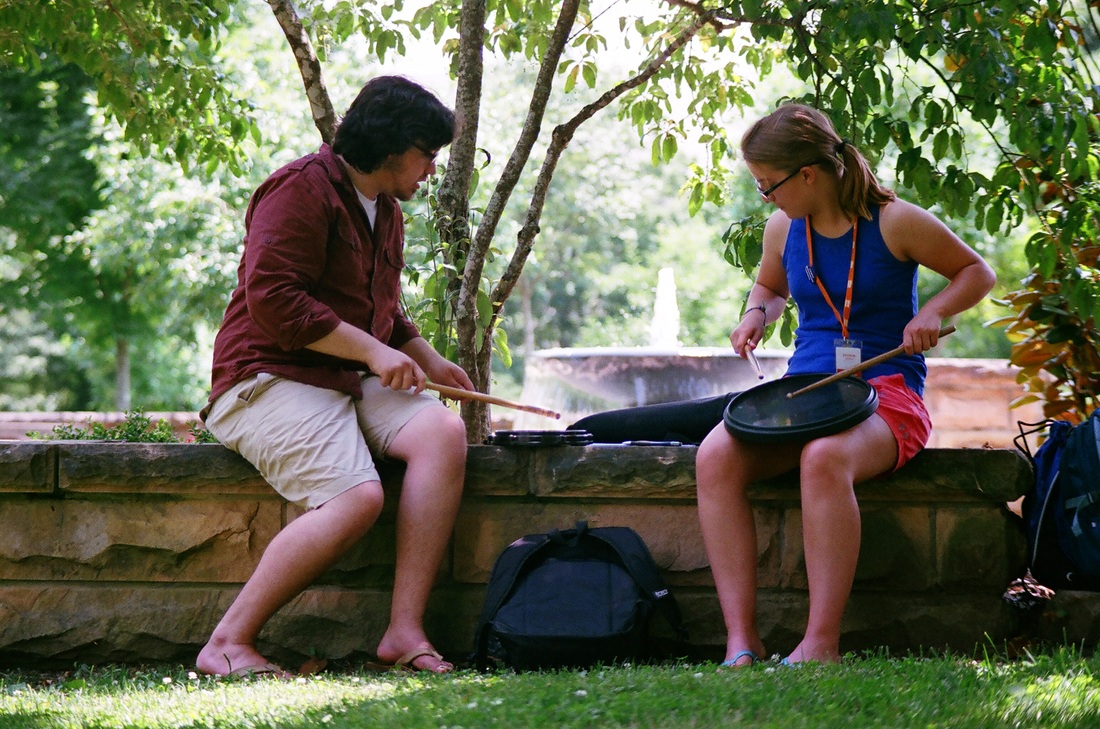 I don't often blog about specific topics on this site ( I guess I should, it is a blog after all) but I need to really get this out to any music students who happen to read this. YOU NEED TO PLAY YOUR INSTRUMENT IN THE SUMMER March, teach, go to a festival, a workshop (or two) but do something that has your instrument in your hand, and on your face. It is vital to your development as a musician - you will make professional and personal connections that will last a lifetime. I can speak directly to this - I first met my good friend and colleague at Mason, John Spirtas ( Principal Percussionist with the Washington National Opera) when we were students at the Aspen Music Festival. I'm heading to NYU in a couple of weeks to teach another MC at NYU, for Jonathan Haas, my teacher from (wait for it....) ASPEN. I still work with folks I met at NOI, Sewanee, from the Duff class, even when I was a SUB at NRO....Festivals matter. Professional connections matter. Go. Invest in your career. http://sewaneemusicfestival.org/summer-study/ So busy, in fact that I haven't made this blog or website the priority it should be. That, however, is changing today.
Right now, I'm down in Austin, Texas just finishing a great day with some outstanding students at Cele MS. THis afternoon I'll catch up with some Austin friends and head over to work with the terrific students at the University of Texas, Austin. Look forward to meeting Tom Burritt and hearing some great percussion! Later this month, I'm back at NYU - for my third session with that great group of students. Thanks Jonathan! February also brings clinic sessions at the Fredrick Day of Percussion, the VA/DC Day of Percussion, two faculty recitals and a recording session. Looking ahead to some great things in March and April ( including some international travel for performances) and another terrific summer at Music for All, and of course the Sewanee Summer Music Festival. travel pics, concert pics and more to come very soon! |
John KilkennyWelcome! I am a percussionist, conductor and artistic leader who drinks a lot of coffee. |
